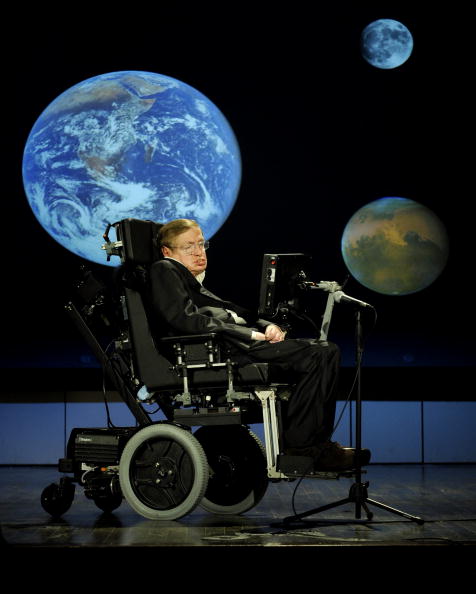This man created a 'black hole' in a lab to prove a decades-old Stephen Hawking theory


A free daily email with the biggest news stories of the day – and the best features from TheWeek.com
You are now subscribed
Your newsletter sign-up was successful
Black holes remain one of space's greater scientific mysteries, but thanks to the artificial replication of the phenomenon in a lab, we could be a step closer to understanding their strange radiation, first described by Stephen Hawking decades ago.
Independent experimental physicist Jeff Steinhauer of the Technion-Israel Institute of Technology in Haifa created an artificial black hole that appears to emit the so-called "Hawking radiation," named for a theory proposed by Hawking in the mid-1970s. Using ultracold atoms, Steinhauer appeared to be able to mimic a black hole's "event horizon," or "the point beyond which the gravitational pull is too strong for even light to escape," Nature explains. The resulting "artificial black hole" Steinhauer created seems to emit a form of the Hawking radiation:
Real black hole: Quantum fluctuations in the vacuum of space produce virtual photons. Sometimes, one of a pair gets trapped behind the event horizon before the two destroy each other, forcing both to become real particles. The photon that escapes is emitted as Hawking radiation.Artificial black hole: Ultracold atoms in a tube undergo quantum fluctuations that produce pairs of virtual particles — in this case, packets of sound called phonons. If one phonon falls in the supersonic region, it is trapped, leading to a sonic form of Hawking radiation. [Nature]
Others say experiments in a lab don't explain much about real black holes. "This experiment, if all statements hold, is really amazing," Silke Weinfurtner, a theoretical and experimental physicist at the University of Nottingham, U.K., told Nature. "It doesn't prove that Hawking radiation exists around astrophysical black holes."
The Week
Escape your echo chamber. Get the facts behind the news, plus analysis from multiple perspectives.

Sign up for The Week's Free Newsletters
From our morning news briefing to a weekly Good News Newsletter, get the best of The Week delivered directly to your inbox.
From our morning news briefing to a weekly Good News Newsletter, get the best of The Week delivered directly to your inbox.
Read more about the experiment, as well as a detailed explanation of Hawking's theory, in Nature.
A free daily email with the biggest news stories of the day – and the best features from TheWeek.com
Jeva Lange was the executive editor at TheWeek.com. She formerly served as The Week's deputy editor and culture critic. She is also a contributor to Screen Slate, and her writing has appeared in The New York Daily News, The Awl, Vice, and Gothamist, among other publications. Jeva lives in New York City. Follow her on Twitter.
-
 The Olympic timekeepers keeping the Games on track
The Olympic timekeepers keeping the Games on trackUnder the Radar Swiss watchmaking giant Omega has been at the finish line of every Olympic Games for nearly 100 years
-
 Will increasing tensions with Iran boil over into war?
Will increasing tensions with Iran boil over into war?Today’s Big Question President Donald Trump has recently been threatening the country
-
 Corruption: The spy sheikh and the president
Corruption: The spy sheikh and the presidentFeature Trump is at the center of another scandal
-
 Blue Origin launches Mars probes in NASA debut
Blue Origin launches Mars probes in NASA debutSpeed Read The New Glenn rocket is carrying small twin spacecraft toward Mars as part of NASA’s Escapade mission
-
 Dinosaurs were thriving before asteroid, study finds
Dinosaurs were thriving before asteroid, study findsSpeed Read The dinosaurs would not have gone extinct if not for the asteroid
-
 SpaceX breaks Starship losing streak in 10th test
SpaceX breaks Starship losing streak in 10th testspeed read The Starship rocket's test flight was largely successful, deploying eight dummy satellites during its hour in space
-
 Rabbits with 'horns' sighted across Colorado
Rabbits with 'horns' sighted across Coloradospeed read These creatures are infected with the 'mostly harmless' Shope papilloma virus
-
 Lithium shows promise in Alzheimer's study
Lithium shows promise in Alzheimer's studySpeed Read Potential new treatments could use small amounts of the common metal
-
 Scientists discover cause of massive sea star die-off
Scientists discover cause of massive sea star die-offSpeed Read A bacteria related to cholera has been found responsible for the deaths of more than 5 billion sea stars
-
 'Thriving' ecosystem found 30,000 feet undersea
'Thriving' ecosystem found 30,000 feet underseaSpeed Read Researchers discovered communities of creatures living in frigid, pitch-black waters under high pressure
-
 New York plans first nuclear plant in 36 years
New York plans first nuclear plant in 36 yearsSpeed Read The plant, to be constructed somewhere in upstate New York, will produce enough energy to power a million homes
